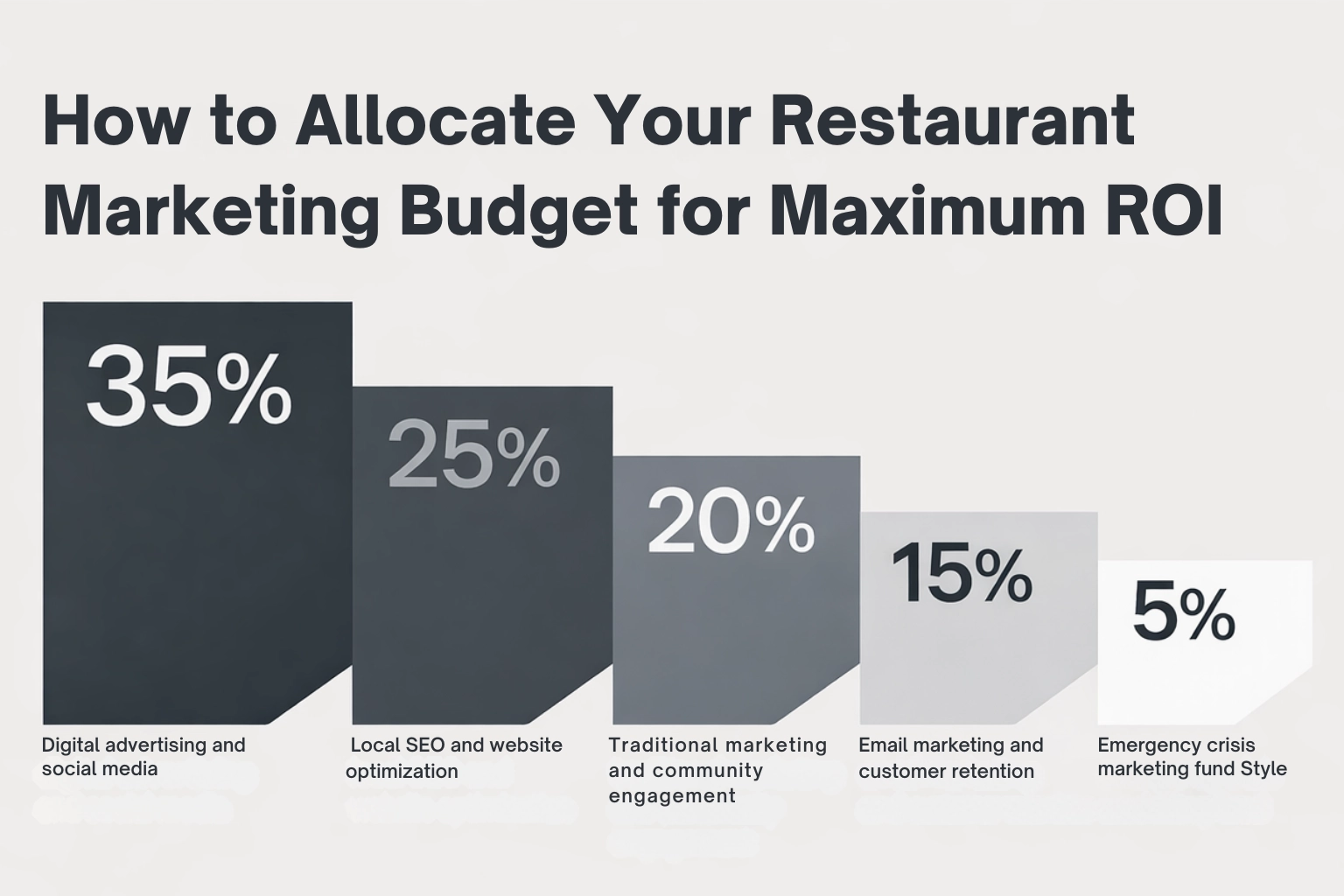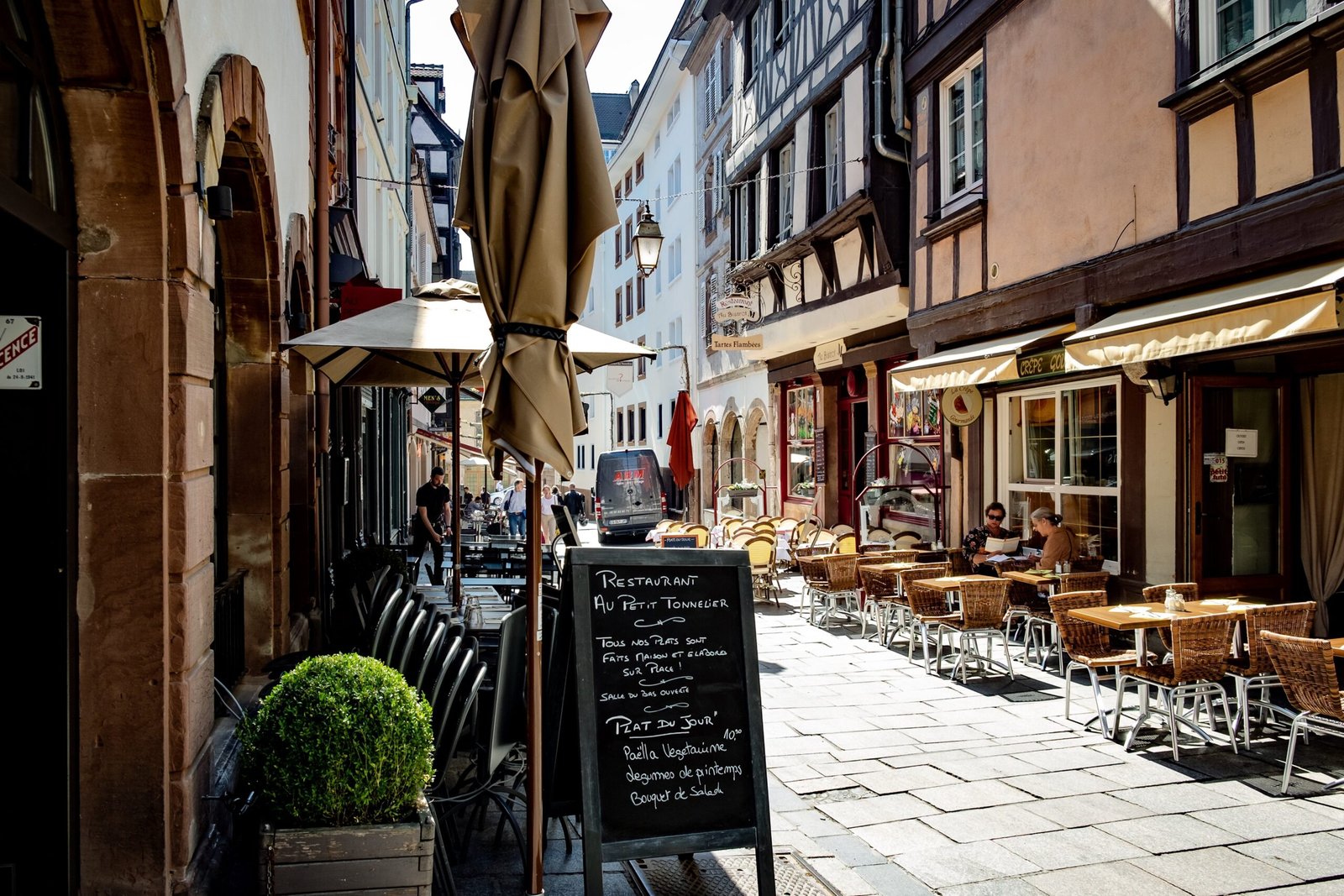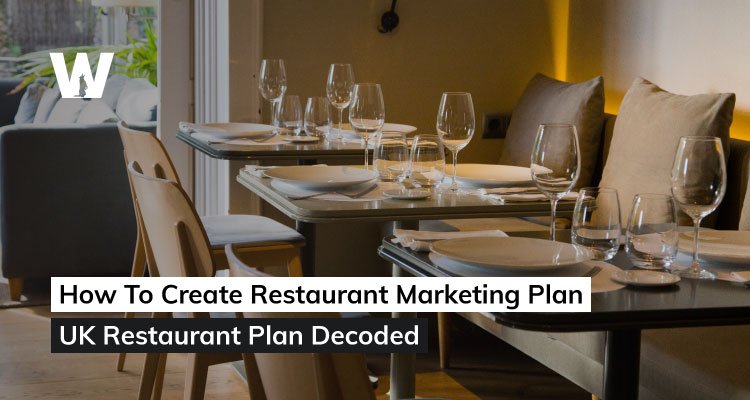Wraps up in 8 Minutes
Running a restaurant in the UK's competitive landscape requires more than exceptional food – you need a strategic marketing plan that drives customers through your doors consistently. With over 749,000 restaurants globally and intense local competition, UK restaurants that lack proper marketing strategies face a 65% failure rate within their first year.
A comprehensive restaurant marketing plan combines digital innovation with traditional community engagement, leveraging local SEO, social media presence, and customer relationship management to build sustainable growth. At Wolfable, we've helped numerous hospitality businesses transform their marketing approach to achieve measurable results in the challenging UK market.
This guide breaks down everything you need to create a restaurant marketing plan that not only survives but succeeds in today's post-Brexit, post-pandemic UK restaurant industry.
Why Do UK Restaurants Need a Strategic Marketing Plan?
The UK restaurant industry faces unique challenges that make strategic marketing essential for survival. Post-Brexit supply chain disruptions, changing consumer behaviors following the pandemic, and the cost-of-living crisis have fundamentally altered how British consumers approach dining out.
Key challenges facing UK restaurants today:
- Reduced dining frequency due to economic pressures
- Increased demand for value-driven experiences
- Rising expectations for sustainability and authenticity
- Shift towards digital-first customer interactions
- Competition from delivery apps and ghost kitchens
Without a structured marketing approach, restaurants struggle to communicate their unique value proposition effectively. A strategic marketing plan helps establish brand recognition, build customer loyalty, and create predictable revenue streams through multiple channels.
The cost of poor marketing is significant. Restaurants without marketing strategies typically experience 40% lower customer retention rates and struggle to achieve consistent monthly revenue. Professional digital marketing services, like those offered by Wolfable, can help restaurants establish robust marketing foundations that deliver measurable ROI.
Struggling with inconsistent customer flow? 📍 Contact Wolfable today for a restaurant marketing assessment and discover how strategic marketing can transform your business performance.
How to Analyze Your Restaurant's Market Position?
Understanding your market position forms the foundation of any successful restaurant marketing plan. This analysis involves examining demographics, competition, and customer behaviors specific to your location and cuisine type.
1. What Demographics Should UK Restaurants Consider?
- Regional dining preferences vary significantly across the UK.
London diners prioritize convenience and international cuisine options, while Manchester and Edinburgh customers often value authenticity and local sourcing. Understanding these regional nuances helps customize your marketing messaging effectively.
- Income levels directly impact dining behaviors.
Areas with higher disposable income support premium dining experiences, while budget-conscious regions respond better to value propositions and family-friendly offerings. Age demographics also influence platform preferences – younger customers engage primarily through Instagram and TikTok, while older demographics prefer Facebook and email communication.
- Cultural diversity considerations become crucial in major UK cities.
Restaurants serving authentic international cuisine must balance appealing to their cultural community while attracting mainstream British customers seeking new experiences.
2. How to Conduct Effective Competitive Analysis?
Identify both direct and indirect competitors within your catchment area. Direct competitors serve similar cuisine at comparable price points, while indirect competitors target the same customer base with different offerings.
Chain restaurants like Nando's and Pizza Express often dominate local search results and customer mindshare. Independent restaurants must differentiate through authentic storytelling, personalized service, or unique menu offerings that chains cannot replicate.
SWOT analysis provides strategic clarity:
- Strengths: Unique recipes, prime location, exceptional service
- Weaknesses: Limited marketing budget, outdated technology
- Opportunities: Untapped customer segments, seasonal events, local partnerships
- Threats: New competitors, economic downturns, regulatory changes
Social media monitoring tools and local SEO analysis reveal competitor strategies and identify gaps in the market that your restaurant can exploit.

What Makes an Effective Restaurant Marketing Strategy?
An effective restaurant marketing strategy combines clear brand positioning with measurable goals and realistic budget allocation. The strategy must address both customer acquisition and retention while building long-term brand equity.
1. How to Develop Your Restaurant's Unique Selling Proposition?
Your USP distinguishes your restaurant from every other dining option in your area. This goes beyond menu items to encompass the entire customer experience, values, and emotional connection you create.
Successful UK restaurant USPs often focus on:
- Authenticity: Family recipes passed down through generations
- Sustainability: Locally sourced ingredients and eco-friendly practices
- Community connection: Supporting local causes and employing local staff
- Innovation: Unique fusion concepts or cutting-edge dining experiences
Brand identity development requires consistency across all touchpoints. Your visual identity, tone of voice, and customer interactions must reinforce your USP consistently. Professional branding services help ensure cohesive brand presentation that resonates with UK audiences.
2. What Goals Should UK Restaurants Set for Marketing Success?
SMART goals provide measurable targets for marketing efforts. Rather than vague objectives like "increase customers," effective goals specify exact targets, timelines, and measurement criteria.
Example SMART goals for UK restaurants:
- Increase monthly foot traffic by 25% within 6 months through local SEO optimization
- Generate 100 new email subscribers monthly through social media campaigns
- Achieve 15% increase in average order value through targeted upselling strategies
- Maintain 4.5+ star rating across all review platforms consistently
Key Performance Indicators (KPIs) track progress toward these goals:
- Table turnover rates during peak hours
- Online order conversion rates
- Social media engagement and reach metrics
- Customer lifetime value and retention rates
- Marketing return on investment (ROI)
Revenue targets should align with UK restaurant industry benchmarks while accounting for local market conditions and seasonal variations.

Which Digital Marketing Channels Work Best for UK Restaurants?
Digital marketing provides the most cost-effective customer acquisition channels for UK restaurants. The key lies in selecting platforms where your target customers spend time and optimizing content for local search behavior.
1. How to Optimize Your Restaurant Website for UK Customers?
Your website serves as your digital storefront and must provide seamless user experience across all devices. With 85% of UK restaurant searches happening on mobile devices, mobile-first design becomes essential rather than optional.
Essential website features for UK restaurants:
- Online ordering integration with popular delivery platforms
- Table booking system with real-time availability
- Complete menu with allergen information (UK legal requirement)
- Delivery radius mapping for accurate service areas
- Google My Business integration for local SEO
Local SEO optimization targets UK-specific search behavior. This includes optimizing for postcode-based searches, local landmarks, and British spelling conventions. Professional SEO services ensure your restaurant appears prominently when local customers search for dining options.
Page loading speed directly impacts conversion rates. UK customers expect websites to load within 3 seconds, with slower sites experiencing 40% higher bounce rates. Technical optimization through professional web development services improves both user experience and search engine rankings.
2. What Social Media Strategies Work for UK Restaurant Marketing?
Platform selection depends on your target demographic and content strengths. Instagram dominates food photography and younger demographics, while Facebook excels for community building and local event promotion.
Instagram strategy for UK restaurants:
- High-quality food photography showcasing menu highlights
- Behind-the-scenes content featuring kitchen preparation
- Stories featuring daily specials and real-time updates
- User-generated content campaigns encouraging customer posts
Facebook marketing focuses on community engagement:
- Local event promotion and partnership announcements
- Customer reviews and testimonials sharing
- Live videos during special events or cooking demonstrations
- Targeted advertising to local demographics
TikTok reaches younger UK demographics through creative video content. Short-form videos showcasing cooking processes, staff personalities, or food challenges can achieve viral reach within local markets.
Content strategy must incorporate British cultural references and humor while maintaining brand authenticity. Seasonal content around UK holidays like Burns Night, Easter, and summer bank holidays demonstrates local community connection.
3. How to Build Effective Email Marketing for Restaurants?
GDPR compliance forms the foundation of all email marketing in the UK. Customers must explicitly opt-in to receive communications, and data protection policies must be clearly communicated and followed.
Database building strategies that work:
- Wi-Fi access requiring email signup
- Loyalty program enrollment incentives
- Birthday club membership with special offers
- Exclusive menu preview access for subscribers
Automated email sequences nurture customer relationships:
- Welcome series introducing brand story and values
- Birthday and anniversary celebration offers
- Seasonal menu update announcements
- Reactivation campaigns for inactive customers
Segmentation improves campaign effectiveness by targeting specific customer groups with relevant messaging. Segments might include frequent diners, special occasion customers, or delivery-only users, each receiving customized content and offers.
Professional email marketing services help restaurants maintain compliance while maximizing engagement rates and customer lifetime value.
4. How to Leverage Influencer Marketing for UK Restaurants?
Influencer marketing provides authentic endorsement that traditional advertising cannot match. UK food influencers have dedicated local followings who trust their dining recommendations, making them powerful allies for restaurant marketing.
Types of influencers that work for UK restaurants:
- Local food bloggers with 5,000-50,000 followers in your area
- Micro-influencers who focus on specific cuisines or dietary preferences
- Lifestyle influencers who showcase dining experiences and social occasions
- Local celebrities and community figures with regional recognition
Effective influencer collaboration strategies:
- Invite influencers for complimentary meals in exchange for honest reviews
- Create Instagram-worthy signature dishes specifically for influencer content
- Partner with influencers for special events and menu launches
- Collaborate on cooking tutorials or behind-the-scenes content
UK-specific influencer considerations include working with creators who understand British dining culture, seasonal preferences, and local food trends. Micro-influencers often provide better ROI than celebrity partnerships because their audiences are more engaged and location specific.
Measuring influencer campaign success requires tracking metrics beyond follower counts. Monitor reservation increases, social media mentions, and new customer acquisition during campaign periods to calculate true ROI.
5. What Paid Marketing Strategies Work Best for UK Restaurants?
Paid marketing delivers immediate visibility and customer acquisition when organic reach proves insufficient. UK restaurants benefit most from location-targeted campaigns that reach hungry customers at the right moment.
Google Ads for restaurants focus on high-intent keywords:
- "Restaurants near me" and location-specific searches
- Cuisine-specific terms like "Italian restaurant Manchester"
- Event-based keywords like "birthday dinner restaurant"
- Delivery-related searches during peak ordering times
Facebook and Instagram advertising excels at visual storytelling that showcases your food and atmosphere. Video ads featuring sizzling dishes or happy customers often achieve higher engagement rates than static images.
Effective paid campaign strategies:
- Target users within 5-mile radius during meal times
- Create separate campaigns for dine-in and delivery customers
- Use retargeting ads for website visitors who didn't make reservations
- Promote special events and seasonal menus to past customers
Budget allocation for UK restaurants typically sees best results with 60% allocated to Google Ads for immediate traffic and 40% to social media advertising for brand building. Start with modest daily budgets (£20-50) and scale successful campaigns gradually.
Advanced paid marketing tactics include dynamic ads showcasing menu items, local event targeting, and competitor audience targeting. Professional paid marketing management ensures optimal budget allocation and continuous campaign optimization for maximum ROI.
Ready to boost your digital presence? Explore Wolfable's digital marketing services and see how we can help you dominate local search results and social media engagement.
How to Implement Traditional Marketing for Local Success?
Traditional marketing channels remain highly effective for UK restaurants, particularly for building local community connections and reaching demographics less active on digital platforms.
1. What Local Community Engagement Strategies Work Best?
Hyperlocal marketing builds authentic community relationships that generate word-of-mouth referrals and customer loyalty. This approach focuses on becoming an integral part of the local neighborhood rather than just another dining option.
Effective community engagement tactics:
- Sponsoring local sports teams and displaying their photos prominently
- Partnering with schools for fundraising events and educational visits
- Participating in parish council meetings and community planning discussions
- Supporting local charities through percentage-of-sales donations
Local newspaper partnerships provide credible third-party endorsement while reaching established local audiences. Restaurant reviews, chef interviews, and community event coverage build brand recognition and trust.
Collaboration with local businesses creates mutual referral opportunities. Partnerships with nearby gyms, salons, or retail stores can generate cross-promotional benefits and expand customer reach.
2. How to Leverage UK Seasonal Events for Restaurant Marketing?
Seasonal event planning capitalizes on predictable UK celebration patterns while creating unique experiences that differentiate your restaurant from competitors.
Major UK seasonal opportunities:
- Burns Night celebrations with traditional Scottish menu offerings
- Easter family dining promotions and special brunch menus
- Summer bank holiday outdoor dining and barbecue events
- Christmas party bookings and festive menu launches
Local food festivals and markets provide direct customer interaction opportunities while showcasing your cuisine to new audiences. Pop-up collaborations with local businesses can introduce your restaurant to their customer base.
Private dining and corporate events generate higher-value bookings while building relationships with local business communities. Marketing these services through LinkedIn and local business networks reaches decision-makers directly.

What Technology Should UK Restaurants Use for Marketing?
Marketing technology streamlines operations while providing data insights that improve campaign effectiveness. The right technology stack automates routine tasks and enables personalized customer communications at scale.
1. What Essential Marketing Tools Do UK Restaurants Need?
Customer Relationship Management (CRM) systems centralize customer data and enable automated marketing workflows. These systems track customer preferences, visit frequency, and spending patterns to support targeted marketing campaigns.
Analytics tools provide performance insights across all marketing channels:
- Burns Night celebrations with traditional Scottish menu offerings
- Google Analytics 4 for website traffic and conversion tracking
- Social media native analytics for engagement and reach metrics
- Email marketing platform analytics for open rates and click-through rates
- Review platform monitoring for reputation management
Reservation and ordering systems integrate with marketing platforms to create seamless customer experiences. Data from these systems informs marketing segmentation and campaign timing.
Marketing automation platforms execute complex campaigns without manual intervention. These systems can trigger welcome emails, birthday offers, and reactivation campaigns based on customer behavior patterns.
Professional digital strategy consultation helps restaurants select appropriate technology solutions that integrate effectively and provide measurable ROI.
2. How Are Emerging Technologies Changing Restaurant Marketing?
QR code menus and contactless ordering became standard during the pandemic and now provide valuable customer data collection opportunities. These systems track menu item popularity and customer preferences while reducing operational costs.
AI-powered chatbots handle routine customer service inquiries while qualifying leads for reservations and events. These systems provide 24/7 customer support and can handle multiple languages for diverse UK markets.
Delivery app optimization requires specific strategies for platforms like Deliveroo, Just Eat, and Uber Eats. Each platform has unique algorithms and customer behaviors that require customized approaches for maximum visibility and orders.
Sustainable marketing practices appeal to environmentally conscious UK consumers while reducing operational costs. Digital receipts, paperless loyalty programs, and social media-based communications align with sustainability values.
Need help implementing the right marketing technology? Get a free consultation with Wolfable and discover which tools will deliver the best ROI for your restaurant's specific needs.
How to Measure Your Restaurant Marketing Success?
Measuring marketing effectiveness requires tracking both financial and operational metrics that directly impact business performance. Regular analysis enables strategy adjustments and budget optimization for maximum ROI.
1. What KPIs Should UK Restaurants Track?
Financial metrics provide direct ROI measurement:
- Revenue per available seat hour (RevPASH) during marketing campaign periods
- Customer acquisition cost (CAC) across different marketing channels
- Average order value changes following promotional campaigns
- Marketing return on investment (ROI) for each channel and campaign
Operational metrics reveal marketing impact on business efficiency:
- Table turnover rates during peak and off-peak hours
- Staff productivity during promotional periods
- Inventory turnover for promoted menu items
- Reservation-to-show-up ratios for different customer segments
Digital engagement metrics indicate brand health and customer interest:
- Website traffic growth and conversion rates
- Social media engagement rates and follower growth
- Email open rates and click-through rates
- Online review sentiment and frequency
2. How Often Should Restaurants Review Marketing Performance?
Monthly reviews enable quick strategy adjustments while quarterly analysis provides broader trend insights. Weekly monitoring of key metrics helps identify issues before they impact revenue significantly.
Monthly review process should include:
- Campaign performance analysis across all channels
- Budget allocation effectiveness and adjustment recommendations
- Competitive landscape changes and response strategies
- Customer feedback analysis and operational improvements
Quarterly strategic reviews assess:
- Seasonal performance patterns and planning adjustments
- Annual goal progress and target modifications
- Market condition changes and strategy adaptations
- Technology upgrades and platform optimizations
Performance data should inform future campaign planning rather than simply documenting past results. Successful marketing requires continuous optimization based on actual customer behavior and market response.
Marketing Channel Comparison Table
Conclusion: Transform Your Restaurant's Success with Strategic Marketing
Creating a successful restaurant marketing plan requires balancing digital innovation with authentic local community engagement. The UK market rewards restaurants that understand regional preferences, comply with local regulations, and consistently deliver value to their customers.
Key takeaways for UK restaurant marketing success:
- Develop a clear USP that differentiates your restaurant from chain competitors
- Prioritize local SEO and Google My Business optimization for immediate visibility
- Build email marketing databases while maintaining GDPR compliance
- Engage with your local community through partnerships and events
- Track performance metrics monthly and adjust strategies based on real data
The restaurant industry's complexity requires specialized marketing expertise to navigate digital platforms, regulatory requirements, and local market dynamics effectively. Many successful restaurants partner with professional marketing agencies to accelerate growth while focusing on their core business operations.
Ready to transform your restaurant's marketing performance? Wolfable specializes in helping UK restaurants build comprehensive marketing strategies that drive measurable results. Our team understands the unique challenges facing British hospitality businesses and creates customized solutions that fit your budget and goals.
From local SEO optimization and social media management to email marketing automation and performance analytics, we provide the complete marketing support your restaurant needs to succeed in today's competitive landscape.
Contact Wolfable today for a free restaurant marketing consultation and discover how professional digital marketing can increase your customer base, improve retention rates, and boost your bottom line. Your success story starts with the right marketing strategy – let us help you create it.
Schedule Your Free Marketing Consultation →
Don't let another month pass without a strategic marketing plan. Your competitors are already investing in professional marketing – ensure your restaurant stays ahead with Wolfable's proven strategies.







